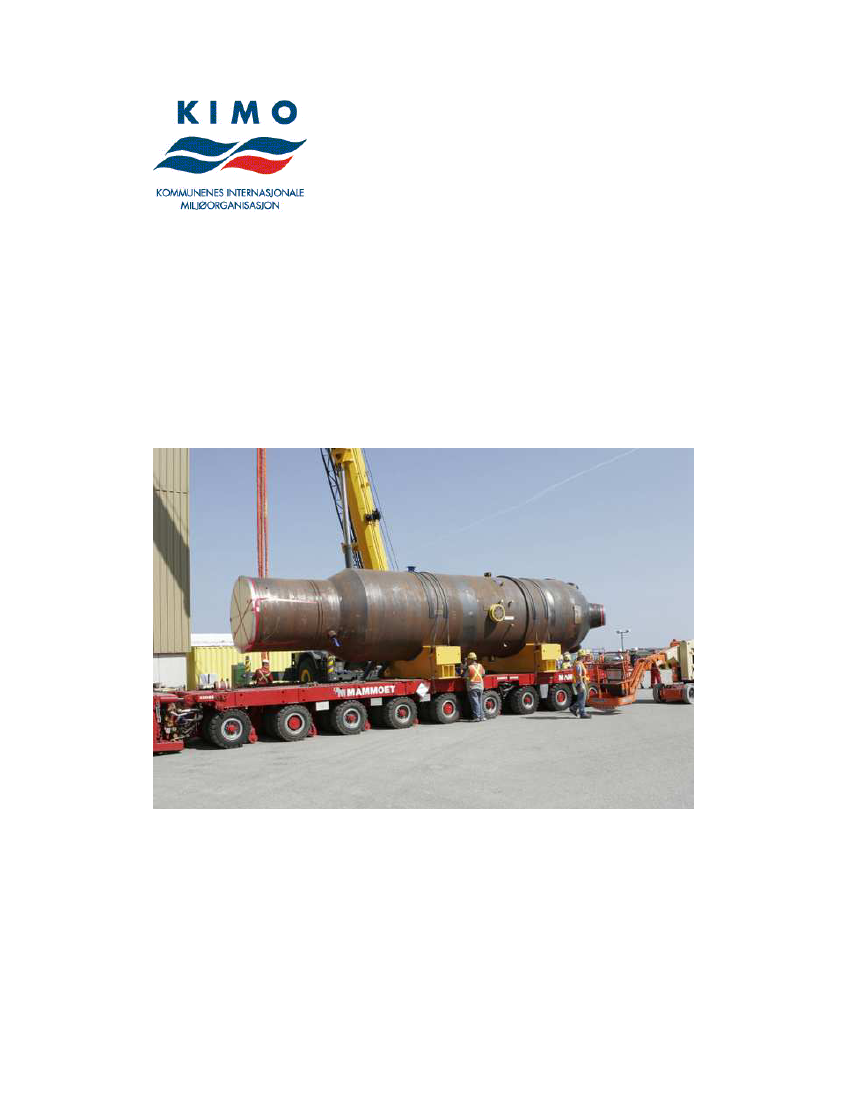Miljø- og Planlægningsudvalget 2010-11 (1. samling)
MPU Alm.del Bilag 511
Offentligt
LOCAL AUTHORITIES INTERNATIONAL ENVIRONMENTALORGANISATIONPRESS RELEASE15 February 2011KIMO CONDEMS HIGHLY RADIOACTIVE WASTE SHIPMENTLast Friday, the Canadian Nuclear Safety Commission approved the proposedshipment of 16 bus-sized radioactive steam generators across the Great Lakes onthe Canadian / US border to a Studsvik plant on the Swedish Baltic coast.
Bruce Power applied in April 2010 to transport the 16 steam contaminators toSweden, where the company Studsvik will decontaminate around 90% of thematerials – and sell the decontaminated scrap metal on the open market – and returnthe generators to Canada, where they will be stored at a facility by the Canadianutility. According to CCNR, the radioactive levels of the generators exceed the legallimits of the International Atomic Energy Authority Regulations for the safe transportof radioactive materials by 50 times (1).The shipments will contain materials like caesium, iodine-129 and tritium, which evenat low levels are potentially dangerous to human health, and have to go through UK,
Norwegian, Danish and Swedish territorial waters after receiving permission fromeach Government. KIMO International is writing to these Governments to outline itsconcern and request that they refuse permission for this shipments which help set aprecedent that it is acceptable to ship radioactive materials around the world fortreatment.KIMO President Mayor Albert de Hoop stated,“These shipments go completelyagainst the proximity principle where the communities which have benefited from thepower produced should deal with the waste generated. Instead coastal communitiesall along the transport route are being put at risk and the treatment will result inemissions to the Baltic Sea, which is already one of the most radioactive in the world.I will be writing to the regulators in the affected countries and in Canada to requestpermission is not granted for these shipments and that these steam generators aretreated and stored at Ontario Power Generation’s Western Waste ManagementFacility as was originally planned.”
For more information contact:Mr John MouatKIMO SecretariatC/o Shetland Islands CouncilInfrastructure ServicesGrantfieldLerwickZE1 0NTTel: 00 44 (0) 1595 744800Fax: 00 44 (0) 1595 744804Mobile: 07881 788830E-mail:[email protected]Website: www.kimointernational.orgNotes to Editors:(1) Media release of the Council of CanadiansMEDIA RELEASE - For Immediate Release, February 5, 2011Council of Canadians condemns CNSC approval of radioactive shipments throughGreat LakesThe Council of Canadians condemns the Canadian Nuclear Safety Commission’s decisionlate Friday to approve the transport of 16 radioactive steam generators by ship across theGreat Lakes to Sweden."The Great Lakes is a shared commons, public trust and protected bioregion," says nationalchairperson Maude Barlow. "These shipments will put the drinking water of 40 million peopleat risk. Announcing this decision late on a Friday is a clear indication that the CNSC knowsthat there will be widespread opposition to their decision."Last April, Bruce Power applied for a special license from the CNSC because the steamgenerators failed to meet CNSC’s own Packaging and Transport of Nuclear SubstancesRegulations. The radioactive levels also exceed legal limits set out in the International AtomicEnergy Agency’s Regulations for the Safe Transport of Radioactive Material by 50 times.Bruce Power plans to ship the 16 bus size steam generators to Sweden for decontamination,with the most radioactive parts of the generators being transported back across the Great
Lakes and stored near its nuclear power plant on Lake Huron. The corporation has at least 64steam generators that it wants to ship to Sweden."These shipments set an extremely dangerous precedent," says national water campaignerEmma Lui. "This opens the door to transporting radioactive waste that exceeds legal limitsacross our lakes."The International Institute of Concern for Public Health has noted that radionuclides found inGreat Lakes water, including tritium, carbon-14, caesium and long-lived iodine-129, poseserious health hazards even at low levels. An accident with just one of Bruce Power’snumerous planned shipments could prove to be disastrous.Nearly 80 groups provided written submissions and half of them - including the Council ofCanadians - intervened at a public hearing last September in Ottawa. The groups expressedconcerns regarding Bruce Power’s insufficient emergency response plans, the lack of anenvironmental assessment and the failure to consult adequately with communities.
(2) A copy of KIMO Resolution 1/96 on the Transportation of Nuclear Waste by Air and Seacanbe found at http://www.kimointernational.org/KIMOResolutions.aspx



